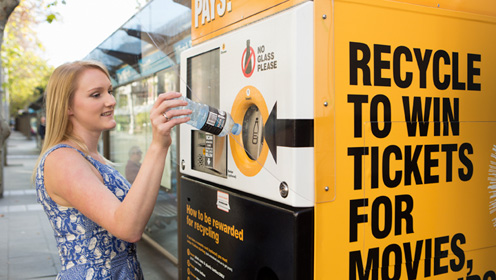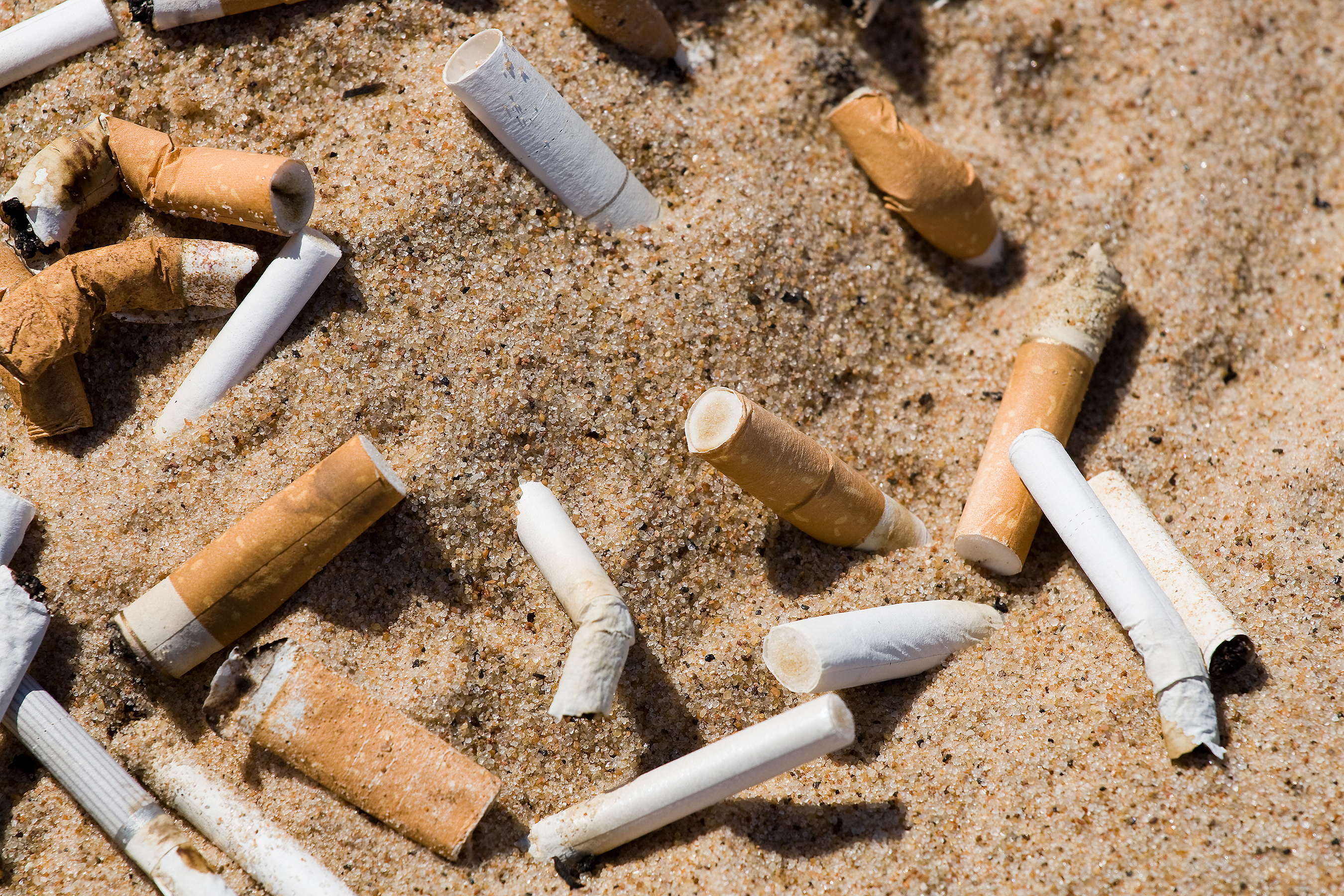Written by: Natalia Brown
Plastic bags, bottles, straws, and cutlery are common targets for plastic waste reduction advocates. But, statistics show that there’s another — arguably more damaging — culprit for waste-related decline in ocean health.
Cigarette butts, also known as filters or ends, are intended to store some of the chemicals that smokers inhale. They manage to capture enough of those chemicals to leach out in marine environments and kill fish once the butts become marine debris.
According to local surveys and national reports, cigarette butts are the most abundant form of waste left behind by beach-goers across the globe. Of the six trillion cigarettes smoked worldwide each year, an estimated 4.5 million butts are tossed directly into the environment. In the United States, “smoking-related debris” make up over one-third of all the anthropogenic waste found on beaches, and in rivers and streams. [Cigarette Butt Pollution Project]
Just as other plastics, cellulose acetate in cigarette butts will photodegrade (physically break down into tiny microplastic bits) but never biodegrade (chemically break down). As a result, the toxic material persists in the environment indefinitely after being littered.
This plastic is uniquely dangerous because it often contains trace amounts of the carcinogenic chemicals from the original cigarette. When the plastic additives, absorbed nicotine, and trace heavy metals (such as lead and arsenic) leach from cigarette butts, they become part of the chemical composition of the surrounding seawater. Once ingested by marine organisms, these microplastics bits pose physical and biochemical risks that can kill marine organisms and/or bioaccumulate throughout the food chain. These adverse effects also impact humans through seafood and drinking water contamination.
“Cigarette butts are a pervasive, toxic and recalcitrant type of marine litter that requires urgent attention from manufacturers, users, authorities and the public to prevent the ingestion of cigarette butts by biota and water pollution from its leachate.” [Environmental Research]
In recent years, traditional cigarette-smoking has been largely replaced by e-cigarettes. “The leading manufacturer, Juul, for example, saw its sales increase nearly sevenfold between 2014 and 2017.” Today, more than 10 million Americans use e-cigarettes.
E-cigarettes are considered hazardous waste and e-waste, have a bulkier plastic exterior, and are becoming a part of mainstream culture. These circumstances only increase the need for responsible management and policy intervention.
Richard Barnes of the University of California stresses the role that regulation should play in ensuring responsible management and mitigation of smoking-related waste. The concepts of “Precautionary Principle”—which states that environmental harm does not have to be proven to justify preventative intervention—and “Extended Producer Responsibility”—which asserts that those who produce a toxic waste product should be held accountable for its cleanup” have been effectively invoked to address concerning waste from other consumer products. [Tobacco Control]
Environmental, aesthetic, economic, and health-related concerns have motivated cigarette smoking bans in a number of public parks and beaches. The first ban of this kind was instituted for Hanauma Bay, Hawaii in 1993. Prohibitions on smoking led by grassroots efforts in Solana Beach, California and Sarasota, Florida have recently engaged a significant number of beach-goers and achieved reductions in coastal pollution. For nearly five years, Sarasota successfully enforced a ban on smoking at its beautiful white sand beaches. However, the preemption was overturned after a “a court decision found only the state could make such laws.”
These cases offer a glimpse at the growing support for cigarette pollution mitigation in coastal communities. Local stakeholders affected by existing bans have emphasized the importance of education and inclusion for municipalities to achieve positive results from similar policies. The general public should be educated on the impacts of cigarette smoking, and smokers’ rights should be upheld in the enforcement of any regulations.

A program similar to the ‘bottle bills’ that have encouraged public participation in responsible waste management through deposit-return systems could be effective for recycling cigarette waste. In Boston, creative receptacles that pose a poll question can be answered by dropping a cigarette butt into one of multiple openings. This has been effective in making the disposal process more engaging and attractive for smokers.
A compulsory take-back policy may also be implemented to reduce cigarette butt waste. This would require for cigarette producers to collect and manage the waste generated from the sale of their products, invoking the principle of Extended Producer Responsibility. The logistics for this type of policy could become very complex and result in inefficient implementation. Policy alternatives are difficult to assess before they have been tried and tested, so it’s important for governing bodies to draw lessons from one another throughout policy adoption and program execution.
Cigarette waste is among the most harmful forms of plastic marine debris. The DFO Team challenges you to abstain from smoking, educate those around you about the impacts of cigarette waste, and advocate for more proactive and preventative mitigation of marine debris. The Butt Stops Here!



